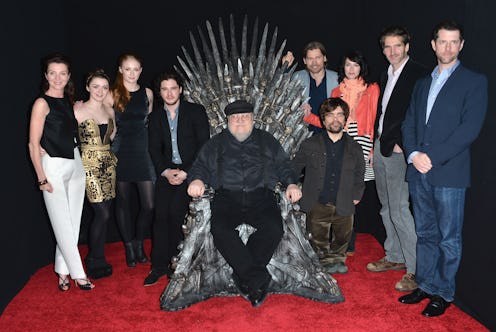Entertainment
Stop Comparing 'Game of Thrones' to 'LOTR'
After "the Internet exploded" when MTV Geek played a game with George R.R. Martin called "G.R.R. vs. J.R.R.," they've come back and played a second round, pitting the characters of The Lord of the Rings against Game of Thrones (don't worry too much though, it's a tie). As much fun as it is to wonder who would win in a fight between Eowyn and Brienne of Tarth, ultimately, it's just that — silly fun. In attempting to compare these two giants of fantasy literature, we see how fast the comparisons start to fall apart. Eowyn was written in the '50s, when the very idea of a woman wanting to fight was radical — of course she'd be weaker than her counterpart written more than 40 years later.
Although the "fight" is kind of arbitrary, you can see in the videos what a huge Tolkien fan Martin is. Not only can Martin rattle off the difference between a warg in Game of Thrones and a warg in Lord of the Rings, but his entire concept for an epic fantasy series, as well as many of his characters, are inspired by Tolkien. Samwell Tarly is just as loyal a friend as Sam Gamgee, Brienne and Arya are the fully realized descendants of Eowyn, Aragorn is just as noble and serious as Eddard Stark.
But attempting to compare them brings into focus the different perspectives of the fantasy realm that Tolkien and Martin occupy. Part of it, as mentioned earlier, is just changing with the times. But although the characters may look vaguely similar, the writers take vastly different approaches towards storytelling. Tolkien took a sort of measured optimism towards his fantasy universe that's influenced, but not driven by, his Catholicism. His characters face real trials, and they don't emerge unscathed, but ultimately they gain something from those experiences. Conversely, Martin's world is much a reflection of our own. Luck or tragedy can befall any character without reason, and there is no defined "right" path to follow.
These "debates" are an great way to compare characters and styles between authors, but ultimately, no value judgment can be made from them. This sort of arbitrary competition between authors (one of whom is dead) who occupy completely different places within popular culture can only go nowhere (as someone who frequently plays "Weezer vs. Smashing Pumpkins" among friends, trust me). When there's not much of a value comparison to be made, the conversation usually devolves into "well, I like this better." And in a genre that's seen as a minority in popular culture, shouldn't we be encouraging more people to read these authors instead of pitting them against one another?
